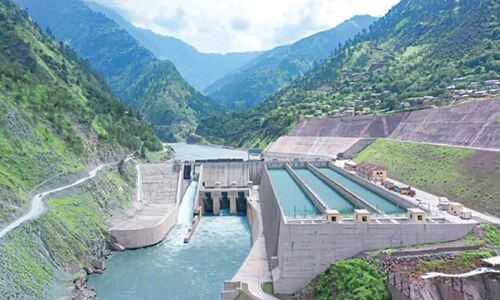In recent decades policymakers have frequently reiterated their commitment to putting the economy on a sustainable and inclusive path, but it has turned out to be an elusive pursuit.
“We are taking pragmatic steps to resolve the bottlenecks to growth,” Finance Minister Ishaq Dar told the World Bank country director on October 8 while pledging to work for sustainable and inclusive economic growth.
A major problem is an all-pervading dogmatism that has stifled efforts to evolve policy principles for pragmatism to work effectively. Nor do we strictly follow the constitutional roadmap for setting up a federal democratic and egalitarian system.
“More productivity and output are needed,” said World Bank Group President David Malpass recently while stressing the need for changing the inflation direction. And he adds that monetary and fiscal policy can help address the supply gap.
It is exceedingly difficult to see a way forward to reduce inequality without raising workers’ ownership of capital
With the primary focus on macroeconomic stability, Pakistan is not on the course Mr Malpass has suggested. The surging current expenditure continues to squeeze fiscal space for development spending, and banks under-serve a large segment of commodity production.
In the absence of robust production levels and enough jobs, inequality and poverty are on the rise. The quantum jump in the realm of inequality research in the West since the last Great Recession has established that growth slows down as inequality rises.
A 2014 study by the Organisation for Economic Cooperation and Development (OECD) demonstrates that growth was faster in the period after World War II when inequality was dropping than it is today.
Over the past few decades, countries with high levels of inequality have grown more slowly than countries with lower levels of inequality. Rising inequality is also associated with lower social mobility.
Making matters worse, inequality’s negative effects are not limited to the economic spheres. Those at the bottom of unequal societies lead shorter lives, suffer from physical and mental health problems and live in broken communities.
Depicting this state of affairs, eminent economist Sheri Berman of Barnard College says the inequality’s consequences go far beyond increasing distance between society’s ‘have’ and ‘have nots’.
He elucidates: inequality has also impacted our democracy, increasing polarisation and shaping the types of candidates that run for office (in polls).
Some leading economists trace the problem of inequality to the fact that production is social and appropriation is private. And the solution now offered is an expanded and improved version of ‘workers capitalism’ as operating in America.
In 2019, 47pc of US workers had some form of ownership or profit sharing at their workplace, but many had small stakes that did not add much to their income. The US Congress should enact new laws that would put employee ownership at the heart of a new economic order, says Richard B. Freeman of Harvard University. In sharp contrast, the number of private sector workers in trade unions declined to 6.4pc in 2018 compared to 16.5pc in 1983.
The 2019 National Opinion Research Centre survey found that 72pc of US workers preferred to work for an employee-owned firm rather than a company owned by the private sector or a government agency.
And similarly, says Mr Freeman, many business leaders with an ownership or profit-sharing scheme in their firm favour employee ownership because their experience shows it works to raise productivity and profits.
Over the past several decades, they showed that intangible investment in some developed countries has been rising while tangible (physical) investment steadily declined.
A recent paper by Michael Handel, a sociologist at the US Bureau of Labour Statistics, demonstrates that ‘humans are handily winning the job market. Job categories that a few years ago were said to be doomed by Artificial Intelligence (AI) ‘are doing just fine.’
With capital earning more of national income than ever before and capital income being far more unequally distributed than labour income, Mr Freeman argues it is exceedingly difficult to see a path forward to reducing inequality without raising workers ownership of capital and capital incomes.
This, he adds, would create more revolutionary democratic changes in our economy than resuscitating unions and bargaining agents. Instead, progressives generally see workers’ ownership as a way to reduce pay income inequality and expand democracy in the workplace.
As far back as 1968, Pakistan had envisioned workers’ ownership in firms by introducing the Companies Profit (Workers Participation) Act (CPA). A portion of the Workers Welfare Fund was earmarked for investment by employees in the shares of the company they worked.
After the 18th Amendment abolished the concurrent list provided in the Constitution, Sindh and Punjab promulgated their own laws on the subject. The issues thus created for trans-provincial companies remain unresolved. No steps were taken to update CPA and expand its scope in light of the experience gained from these initiatives.
In June 2018, Ismail Sattar, then president of the Lasbela Chamber of Commerce and Industry, pointed out that the business entities contribute 5pc of their pre-tax profits yearly to the Workers Fund. The maximum amount that goes to the individual workers is limited.
As a result around 25pc of the fund is distributed among any of the eligible workers and 75pc goes to the government to be utilised for projects for workers welfare like schools, housing colonies and health centres. Even though a major chunk of the fund goes to the government, he adds, the workers are still suffering from a lack of social security.
Published in Dawn, The Business and Finance Weekly, October 17th, 2022














































Dear visitor, the comments section is undergoing an overhaul and will return soon.